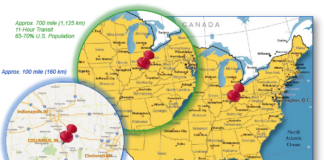General Motors Co. and POSCO Chemical plan to build a $400 million facility in Bécancour, Quebec to produce cathode active material (CAM) for GM’s Ultium batteries, which will power electric vehicles such as the Chevrolet Silverado EV, GMC HUMMER EV and Cadillac LYRIQ. The companies are working with the governments of Canada and Quebec on the project.
GM and POSCO previously announced plans to form a CAM processing joint venture in December 2021. Construction of the new facility, which will be operated by the joint venture, will begin immediately and create approximately 200 jobs. The project will allow for future expansion opportunities as GM continues to pursue future electric vehicle (EV) supply chain projects.

“GM and our supplier partners are creating a new, more secure and more sustainable ecosystem for EVs, built on a foundation of North American resources, technology and manufacturing expertise,” said Doug Parks, GM executive vice president, Global Product Development, Purchasing and Supply Chain. “Canada is playing an important role in our all-electric future, and we are grateful for the strong support we have received from local, provincial and national officials to grow a North American-focused EV value chain.”
The Quebec site will process CAM, a key battery material consisting of components like processed nickel, lithium and other materials representing about 40% of the cost of a battery cell.
“It is so exciting to see GM Canada and Quebec playing a key role in building the emerging ‘mines to mobility’ EV battery ecosystem in North America,” said Scott Bell, president and managing director, GM Canada. “With this new processing facility in Bécancour, GM will help lead the EV battery supply chain while also launching Canada’s first full EV manufacturing plant in Ingersoll, Ontario, later this year.”
“POSCO Chemical is set to expand battery material supplying capability across North America through establishing a cathode material plant in Canada,” said Min Kyung-Zoon, CEO of POSCO Chemical. “We will lead the successful transition to the EV era by further strengthening the strategic partnership with GM and securing a production line with world-class technological competitiveness.”
By the end of 2025, GM plans to have capacity to build 1 million electric vehicles in North America. The company’s goal is to have the majority of components (by value) sustainably sourced, processed or manufactured in North America.
New EV Chargers Coming To Thunder Bay
The Canadian government is making it easier to purchase, charge and drive electric vehicles (EVs) by investing $500,000 in the Thunder Bay Community Economic Development Inc. (CEDC) to support the installation of up to 63 EV chargers across Ontario.
“The CEDC is excited to bring more electric vehicle charging stations to the city and encourage the usage of smart technology in the transportation sector,” commented Eric Zakrewski, CEO, Thunder Bay CEDC. “Plug in Thunder Bay will support business owners, property owners, our academic institutions, indigenous groups and institutions, and many others cover up to 50% of costs to purchase and install EV charging stations. Through this funding, CEDC has the opportunity to support $1 million in electric vehicle infrastructure locally.”
The Honourable Patty Hajdu, Minister of Indigenous Services and Minister Responsible for the Federal Economic Development Agency for Northern Ontario, made the announcement on behalf of Jonathan Wilkinson, Minister of Natural Resources. The investment will be funded through the Natural Resources Canada’s Zero-Emission Vehicle Infrastructure Program (ZEVIP).
“We’re making electric vehicles more affordable and charging more accessible for Canadians from coast to coast to coast,” said Wilkinson. “Investing in more EV chargers, like the ones announced today in Ontario, will put more Canadians in the driver’s seat on the road to a net-zero future, and help achieve our climate goals.”
All EV chargers will be installed in public places, multi-unit residential buildings, on streets, at workplaces or facilities for servicing light-duty vehicle fleets by March 2023.
Since 2015, Canada has invested $1 billion to make EVs more affordable and chargers more accessible for Canadians. These investments support the establishment of a coast-to-coast network of chargers in local areas, while federal rebates of up to $5,000 are helping more Canadians make the switch to an EV. Canada’s is working toward ensuring all new passenger vehicles sold in Canada are zero-emission by 2035.













![[VIDEO] Get More for Your Business in Ardmore. Oklahoma](https://businessfacilities.com/wp-content/uploads/2024/02/maxresdefault-324x160.jpg)
